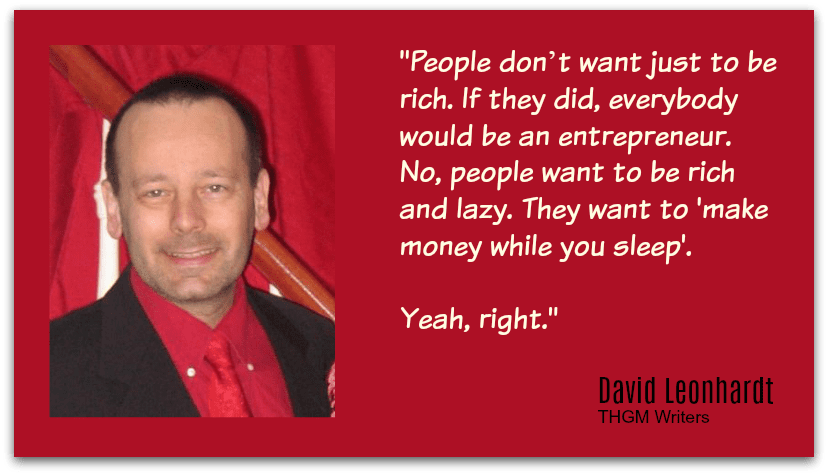If you read biographies of successful entrepreneurs, whether full-length books or short articles, the first thing that will strike you is how unique is each of their paths to success.
Yet, there are some common themes. In fact, there are some things that a successful entrepreneur just can’t do without. If you want to be a successful entrepreneur, here are five must-haves.
Hard work
Thomas Edison said that “Genius is one percent inspiration and ninety-nine percent perspiration.” It’s great to have big ideas. But they remain ideas until you do the work, the ninety-nine percent.
This might be the reason why there are so few entrepreneurs. People are lazy. Yes, most of us are lazy some of the time, and lots of people are lazy lots of the time.
In fact, laziness is the second biggest draw to scams. The biggest draw is, of course, riches.
But people don’t want just to be rich. If they did, everybody would be an entrepreneur.
No, people want to be rich and lazy. They want to “make money while you sleep”. They seek out “the lazy man’s road to wealth”. The ‘realists” among us recognize that some work is needed, so they want to “get rich working just two hours a day”.
Yeah, right.

As Sujan Patel says:
But unfortunately, this type of laziness – when left unchecked – can seriously derail your entrepreneurial dreams. The bottom line, hard truth of the matter is that running a business (whether successful or not) is damn hard. It’s hard work – day-in and day-out.
We know that successful entrepreneurs work more hours than the clock provides. In fact, I sometimes wonder if business success goes mostly to people who need the least sleep.
Without hard work – 99 percent – there is no business success.
Understanding the market
There is only one way to make a profit in business: convincing somebody else to give you money. There are a few qualifications for that, of course.
Somebody has to give you more money than you spend convincing them to give it to you. Otherwise, there’s no profit.
They have to agree to give you the money. Otherwise, you could qualify for free housing after visiting your friendly neighborhood judge.
But why would somebody just give you money? That sounds like a pretty sketchy business model.
You have to give them a reason. That’s where products and services come in.
People will give you money over and over and over again if you give them something they value more.
Not something more valuable.
Not the best that you produce.
Not the biggest or the most famous or the best rated.
They will trade their money only for something they value more.
They might value it for being big or rated highly or for its scent or taste or color.
Or they might not.
So, you have to know your market. You have to know what they need. You have to know what they want. You have to produce what they will value and market it so that they see the value in it.
Skill
That’s where skill comes in.
Working hard is not enough. Knowing what you are doing is not enough. You have to actually do it well.
You have to create a great product or offer a great service.
That does not mean you have to be able to personally build the product. Your skill might be in organizing a skilled team. In fact, that’s much of what an entrepreneur does, because you can’t be skilled at design and manufacturing and distribution and marketing and customer service. But you can be skilled at putting all those pieces together.
Strategy
You need some strategy. You need to be able to make the most of the skills you have. You need to be able to compensate for weaknesses.
You need to be able to define your market and how you will reach them. All that skill you have putting together teams is useless if you don’t plan for success.
You need to plan for cash flow.
You need to plan for marketing.
You need to plan your product line.
There is so much planning that goes into running a business. Making effective plans is what your strategy is all about.
Your biggest market might be 20-somethings. But you might be able to make a much bigger profit margin selling a souped-up version of your product to 30-somethings. You can’t get the credit to do both, so which will it be? Or, maybe you could get the credit, but you would spread yourself too thin and risk under-achieving with both markets.
The strategy is about doing things smartly. It’s about using your brain.
Without a strategy, you are leaving the success of your business venture up to dumb luck.
Luck
Speaking of luck, you’ll need that, too.
A strategy is about what you can control. Luck is about what you can’t control. There are so many things that can sway consumer demand and interest. The market can turn on a dime, either filling your cup or leaving you parched.
The good news is that you will get lucky. Indeed, you will get lots of luck.
With any luck, you’ll get lots of good luck and very little bad luck.
But it could be the opposite. You could get a lot of bad luck, and very little good luck.
A strategy is about planning for those things you can control. But it’s also about planning for things beyond your control.
You need contingency plans for every foreseeable unfortunate turn.
You also need contingency plans to take advantage of good luck.
Let’s suppose something happens that suddenly puts your product in high demand. Can you easily scale fulfillment? Can your website handle the stampede of traffic?
Are you ready for success?
Do you have what it takes to succeed?
Are you ready to work hard?
Do you understand your market?
Do you have the skills it takes to deliver the goods?
Do you have a strategy to channel your hard work, knowledge, and skill?
Do you have luck? Of course, you have. And if you have the other four items on our list, there’s a better-then-even chance that the luck you have will be good luck.
There are no guarantees in the business. But you can set yourself up for success, rather than for failure. Make sure to get as much of these five items as you can, for the best chance at success.


